Question: are you equipped to recognize freelance writing scams when they cross your path?
If you’re new to this world, it may not be obvious at first. But there are signs.

When I got started in freelance writing, it was tough to get published. Nothing saw the light of day without an editor’s approval.
Today, the situation is reversed. It’s easy to get published and become a freelance writer. Set up your own blog and press “Publish.” Presto! Your work is out there, before the entire world.
Another way: Sign up on one of the untold hundreds of websites that promise you awesome exposure on their platform.
With all the “opportunities” out there, what’s harder today is avoiding scams and making sure you find situations that pay you a living wage.
Exposure—a waste of time, or is it a freelance writing scam?
At this point, I’m hoping writers know they should get paid. And that free exposure online isn’t all that valuable, unless you’re posting on a high-traffic site with a great reputation.
If you don’t keep that in mind, you could waste a lot of time writing for websites that offer little in the way of either pay or exposure. Often, you don’t even get good clips out of it. You’re just spinning your wheels as a freelance writer, going nowhere.
Some of the freelance writing scams out there could even damage your reputation if you get involved.
One day this week, I got three offers to sign up with writer website platforms in a single day.
I usually just hit “delete” right away, but I decided to check them out. I discovered there are many flavors of rip-offs and scams going on out there right now.
Let’s take a look.
Case Study 1
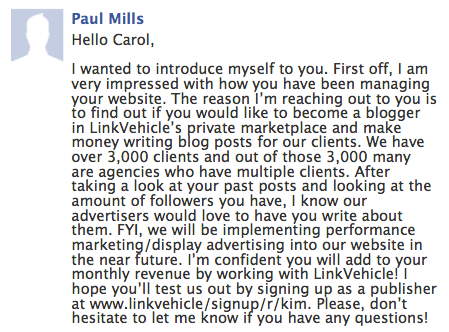
Write about your advertisers? That’s sort of an odd offer.
Also, don’t you find it interesting that instead of sending me to a main signup page or the home page, he sends me to this weird subpage? Smells to me like this guy is affiliate selling this platform and maybe making a cut if I sign up with them.
Or trying to—I tried that page and got a 404.
Main signup page has the details—here’s the key stuff to know:
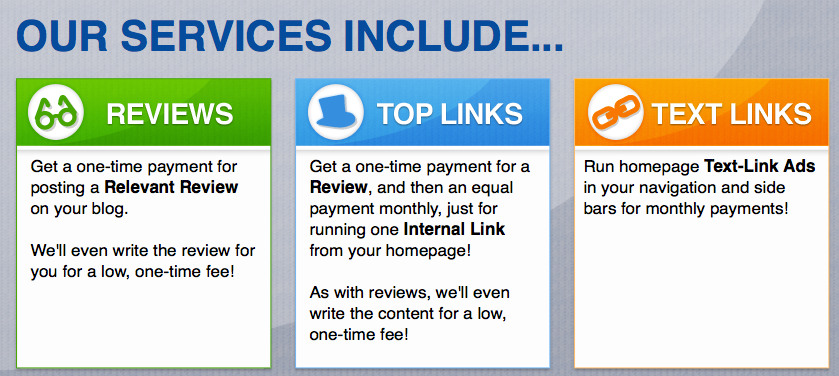
Sites like these connect you with advertisers who want exposure on your blog. They might pay you a small fee for posting a paid review on your blog, or for seeding a link to something onto your home page.
They’ll even write that “unbiased” review for you! (😂)
And charge you for it. Hard to see there’s going to be a profit in it for you after that.
Funny that in another part of the site, it says “Publishers—there are no hidden fees. We just want your voice.” (Sounds creepy, like Ursula taking Ariel’s voice away in The Little Mermaid or something.) Sounds more like what they really want is to rent my audience, without full disclosure.
I’m hoping you’re scam detector is going off here. It’s not worth risking the trust you’ve built with your blog audience to run paid reviews where you don’t disclose that you got paid.
And if you do disclose it, your trust is blown straight away.
There’s also some language on that LinkVehicle site about writing “whether for exposure or pay.” So maybe they’ll pay me, maybe not?
There are ways to do sponsored posts right, but I get an oogy “gray hat” feeling out of this site.
Sponsored posts done right
It is possible to do sponsored posts in a way that’s ethical and doesn’t blow your credibility with readers. For instance, Nick Evans over on the Macheesmo food blog (I’m hooked!) used to have a food company sponsor a blog post.
Then he would offer a recipe that includes an ingredient from that company, all while clearly explaining that the company challenged him to create a type of recipe with their food, and that they are the sponsor of the post.
All aboveboard and to the readers’ benefit, as they get a nice recipe idea out of the deal. It’s not an endorsement by the blogger, but a challenge he was given to create that recipe.
I think food blogs are well-suited to this sort of thing, and sites that do product reviews regularly. Many other types of blogs are not. If you’re considering accepting sponsored posts, think carefully about whether it’s worth it. Ditto with slapping up ads that might just annoy readers.
The big thing to know about offers to place guest posts on your blog that come from link-seeking companies is that Google hates it and may penalize your blog’s search rankings, as Matt Cutts recently pointed out. Just another reason these sort of guest posts probably aren’t worth the small sum they’d give you for the right to post them on your blog.
Case Study 2
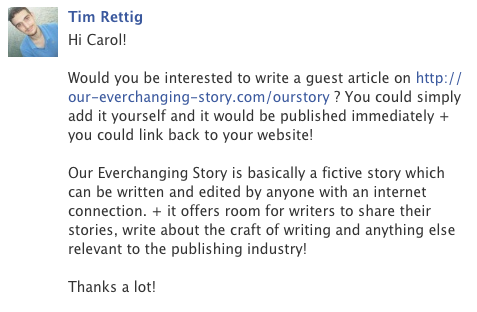
Took a look at the home page first, rather than that subpage link he sent me, and got this (see screenshot):
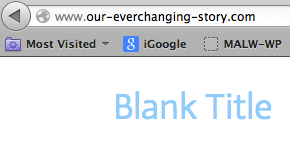
Aside from a stock graphic, the home page was empty. I consider that a pretty big red flag.
On the subpage, I did actually find some text. Writers are invited to collaborate on stories in a wiki format where anyone can change your work. Bet writers are just stampeding to have their work rewritten by strangers.
We’re invited to “post your work for free or even sell it in our marketplace.” Which would certainly be a better earning scenario than posting it on Amazon…NOT.
If you’re looking for a place to give away your work, this might be an opportunity, since Amazon doesn’t let you offer e-books free except for short periods. Otherwise, it’s hard to see the appeal.
You can publish on your own blog free, too, and keep total control of your work.
Is it really a scam? They’re aboveboard about not paying you, so maybe it’s just not a good opportunity.
Case Study 3
Finally, I received this comment on my blog:

Yes, the ungrammatical URL is a red flag.
But this one intrigued me because I’m always looking to add to my list of websites that pay $50 or more per post, so I went to the website mentioned. Prominently featured was this handy sidebar on the site’s top earners:
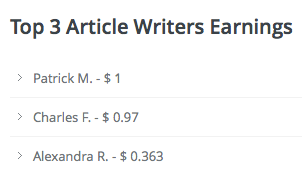
Wow, sign me up!
Sarcasm aside, this site clearly isn’t offering any real pay to writers. Just another “pennies-for-clicks” kind of place. I consider these scams because of how they lure you with the promise of pay, but there rarely is any.
Research the exposure
To see what sort of exposure opportunities these sites might be—since there’s little or no pay involved—I ran the Ever-Changing Story site and Me Seek Articles through Alexa.
Got the following results: Me Seek Articles is ranked over 400,000th globally, and Ever-Changing Story is too small to have any ranking data at all.
In other words, these sites don’t have traffic. You’re not getting any valuable exposure from posting work on these places.
Scam-avoidance tips
To sum up, when someone emails you or posts on your Facebook page offering you an opportunity to sign up to write somewhere, be cautious.
Be wary of any platform that’s out soliciting loads of writers. Good clients usually just need one or two.
Remember that it’s a dead business model to aggregate masses of low-grade content to put ads against in hopes of affiliate revenue for clicks, thanks to Google’s algorithm changes. Startups continue to try this model despite this—don’t get sucked in. It will never pay well.
Look for things like:
- A street address and phone number
- A contact person’s email and name
- A recognizable company or brand
- An about page where you can learn more (Me Seek Articles lacked one)
- Firm, guaranteed pay rates rather than speculative, possible future pay based on traffic or clicks
- For sponsored-post or blog ad offers, nothing is kept secret from your blog readers
It’s easy to waste time writing for places that won’t help your career, or to hurt your credibility by getting involved in shady offers. Steer clear of these and keep looking for real, paying markets.
